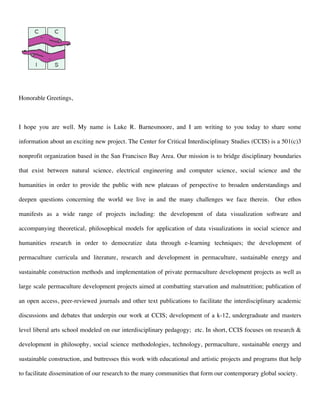
CCIS nonprofit promotes interdisciplinary research
- 1. Honorable Greetings, I hope you are well. My name is Luke R. Barnesmoore, and I am writing to you today to share some information about an exciting new project. The Center for Critical Interdisciplinary Studies (CCIS) is a 501(c)3 nonprofit organization based in the San Francisco Bay Area. Our mission is to bridge disciplinary boundaries that exist between natural science, electrical engineering and computer science, social science and the humanities in order to provide the public with new plateaus of perspective to broaden understandings and deepen questions concerning the world we live in and the many challenges we face therein. Our ethos manifests as a wide range of projects including: the development of data visualization software and accompanying theoretical, philosophical models for application of data visualizations in social science and humanities research in order to democratize data through e-learning techniques; the development of permaculture curricula and literature, research and development in permaculture, sustainable energy and sustainable construction methods and implementation of private permaculture development projects as well as large scale permaculture development projects aimed at combatting starvation and malnutrition; publication of an open access, peer-reviewed journals and other text publications to facilitate the interdisciplinary academic discussions and debates that underpin our work at CCIS; development of a k-12, undergraduate and masters level liberal arts school modeled on our interdisciplinary pedagogy; etc. In short, CCIS focuses on research & development in philosophy, social science methodologies, technology, permaculture, sustainable energy and sustainable construction, and buttresses this work with educational and artistic projects and programs that help to facilitate dissemination of our research to the many communities that form our contemporary global society.
- 2. CCIS’ work can be conceptualized as divided into tree essential nodes, Nature, Art and Technology (N.A.T. ed.). Our Nature work finds its center of gravity in our Permaculture, Sustainable Energy and Sustainable Construction (PSeSc) Division. CCIS PSeSc is establishing research laboratories in the Pacific Northwest and Canadian Shield to develop and test new Permaculture, Sustainable Energy and Sustainable Construction methods, and partners with an array of groups including the University of British Columbia Urban Studies Lab (which is housed in the Department of Geography and partnered with the Department of Forest Resource Management) and Energy Productivity Inc. to disseminate our research findings both to industry and to the general public. CCIS Tech finds its center of gravity in the UBC Urban Studies Lab; presently focused on development of theoretical and methodological models for application of data analytics software in social science and humanities research, CCIS Tech’s five year plan is to move into development of free, open source, browser based software packages that allow users to collect, store and visualize data in real time within the ethos of democratization in the digital sphere. For CCIS, democratization means not only providing access to information through, for example, the development of ‘datascopes’ (software packages), but also providing access to the ideas and experiences that allow us to form cogent, rational knowledge about the information we perceive—this vision is clear in our dual focus on development of both data visualization software packages and theoretical and methodological models by which we may come to form cogent, rational knowledge concerning the information visualized therein. CCIS Arts focuses first and foremost on providing artistic support for CCIS PSeSc and CCIS Tech projects, providing everything from original artwork for books published by CCIS Staff to documentary videos to help disseminate information about CCIS projects and methods to the CCIS Community and general public.
- 3. CCIS’ teleological imperative is education. As such, our long-term (5-10 year) goals are centered on the establishment of K-12, Undergraduate, Masters and Adult Education level educational programs. Our work in K-12 education will focus on developing and disseminating structures (liberal arts courses, arts classes, sports activities, etc.) and curricula to support families pursuing homeschool education as well as an array of public (in CCIS centers) and digital media courses in philosophy, permaculture, sustainable energy & construction, etc. oriented towards youth leaders. Our Undergraduate and Masters level programs will embody the nomadic ethos of CCIS: students will, after spending the first year of their program in their ‘Home Center’, spend the duration of their degree traveling between the global array of CCIS centers to integrate the different dimensions of CCIS Interdisciplinarity (i.e. from applied engineering in CCIS PSeSc Research to contemplative philosophy and poetry in CCIS Arts Research) and the multivariate socio-cultural and natural environmental factors associated with each CCIS center (e.g. which experts are living in each center, the many and varied cultural environments surrounding our global centers, etc.) into their own research program; in short, we hope to integrate the experiential dimensions of education that cannot be found in a classroom into our educational program. CCIS’ Adult Education will provide courses, again both at CCIS centers and online, designed to train people in the practical skills associated with Permaculture, Sustainable Energy and Sustainable Construction, Art, Music, etc. as a means for both personal and economic development (e.g. finding ways to express and relive negative or painful emotions through art or writing or providing people with the skills needed to install solar panels on their home). As I am sure you can see, CCIS’ work is quite wide ranging, and a more detailed description would be too long for such a brief note. If any of the above strikes your interest, I encourage you to take a look at our website
- 4. which provides a more holistic view of CCIS and its Staff. Also, please feel free to send me an email at luke@barnesmoore.com with any questions you might have. Thank you for your time. Best Regards, Luke Luke R. Barnesmoore Founder, President, Executive Director Center For Critical Interdisciplinary Studies (Co)Founder/ Director UBC Urban Studies Lab University of British Columbia
